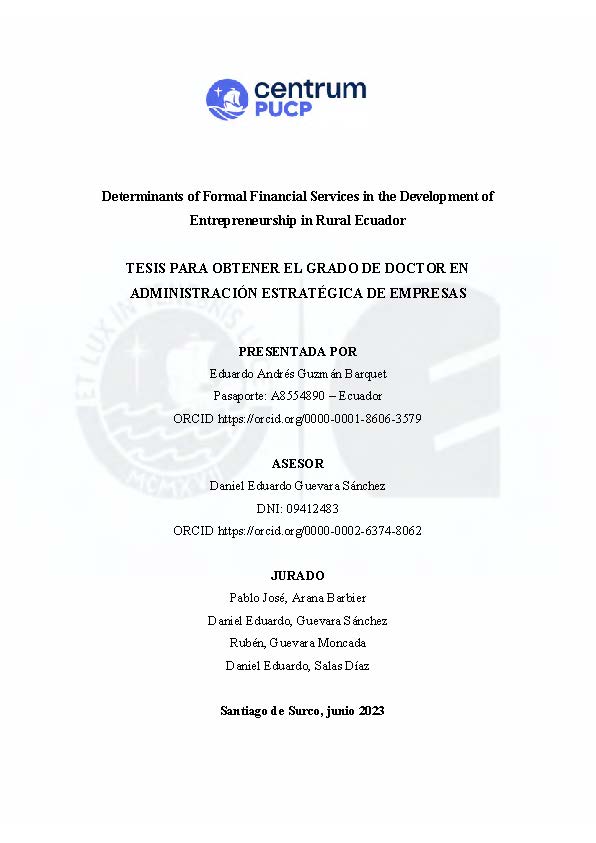| dc.contributor.advisor | Guevara Sánchez, Daniel Eduardo | |
| dc.contributor.author | Guzmán Barquet, Eduardo Andrés | |
| dc.date.accessioned | 2023-07-22T17:46:20Z | |
| dc.date.available | 2023-07-22T17:46:20Z | |
| dc.date.created | 2023 | |
| dc.date.issued | 2023-07-22 | |
| dc.identifier.uri | http://hdl.handle.net/20.500.12404/25435 | |
| dc.description.abstract | Purpose: To analyze the determinants of access to and use of formal financial services through
the banking correspondent channel on the development of enterprises in rural areas of Ecuador.
Method: Qualitative case study methodological strategy. Eighteen rural communities of the
Coast and Highlands of Ecuador were studied. A thematic analysis was carried out to identify
and analyze recurring patterns within the data. themes and sub-themes were categorized,
allowing for the exploration of underlying meanings of interviews. Through an inductive
analysis in Atlas.ti 9. The concepts identified in the interviews and the researcher's files were
reviewed and the results were compared with the theoretical assumptions specified in the
literature.
Results: The main new contribution of this research to the business management knowledge of
this research was the following: This study showed that there is a gap on the effect of banking
correspondents without access to credit on the economic development of communities. In the
case of Ecuador, correspondents differ in that they do not grant credit, which reaffirms that
financial inclusion generates business development, not access to credit. The presence of the
correspondent in communities has eliminated non-financial transaction costs by reducing the
physical distance between the user and the distributor of financial services. The non-payment
of non-financial transaction costs positively affected the generation of savings; in addition, the
presence of the correspondent allowed the inhabitants to open savings accounts, which are used
for personal and business transactions. Many businesses started their activities after the
incorporation of the correspondent due to the concentration of potential customers of local
businesses. In addition, the growth of business after correspondent banking is generated from
the savings of time and money.
7
Limitations and recommendations for future research: It is recommended to empirically
address the effect of access to financial services, without considering credit, on
economic development and poverty reduction. | es_ES |
| dc.description.abstract | Propósito: Analizar los determinantes del acceso y uso de servicios financieros formales
a través del canal de corresponsalía bancaria en el desarrollo de empresas en zonas rurales
del Ecuador.
Método: Estrategia metodológica de estudio de caso cualitativo. Se estudiaron dieciocho
comunidades rurales de la Costa y Sierra del Ecuador. Se llevó a cabo un análisis temático
para identificar y analizar patrones recurrentes dentro de los datos. Se categorizaron los
temas y subtemas, lo que permitió la exploración de los significados subyacentes de las
entrevistas. A través de un análisis inductivo en Atlas.ti 9. Se revisaron los conceptos
identificados en las entrevistas y los archivos del investigador y los resultados se
compararon con los supuestos teóricos especificados en la literatura.
Resultados: La principal nueva contribución de esta investigación al conocimiento de la
gestión empresarial de esta investigación fue la siguiente: Este estudio mostró que existe
una brecha sobre el efecto de los corresponsales bancarios sin acceso al crédito en el
desarrollo económico de las comunidades. En el caso de Ecuador, los corresponsales
difieren en que no otorgan crédito, lo que reafirma que la inclusión financiera genera
desarrollo empresarial, no acceso al crédito. La presencia del corresponsal en las
comunidades ha eliminado los costos de transacción no financiera al reducir la distancia
física entre el usuario y el distribuidor de servicios financieros. El no pago de los costos
de transacción no financieros afectó positivamente la generación de ahorro; además, la
presencia del corresponsal permitió a los habitantes abrir cuentas de ahorro, las cuales se
utilizan para transacciones personales y comerciales. Muchos negocios iniciaron sus
actividades luego de la incorporación de la corresponsal debido a la concentración de
clientes potenciales de los comercios locales. Además, el crecimiento del negocio después
de la banca corresponsal se genera a partir del ahorro de tiempo y dinero.
2
Limitaciones y recomendaciones para futuras investigaciones: Se recomienda abordar
el empíricamente efecto del acceso de los servicios financieros, sin considerar el crédito,
en el desarrollo económico y la reducción de pobreza. | es_ES |
| dc.language.iso | eng | es_ES |
| dc.publisher | Pontificia Universidad Católica del Perú | es_ES |
| dc.rights | info:eu-repo/semantics/openAccess | es_ES |
| dc.rights.uri | http://creativecommons.org/licenses/by-nc-nd/2.5/pe/ | * |
| dc.subject | Servicios financieros--Ecuador | es_ES |
| dc.subject | Innovaciones tecnológicas | es_ES |
| dc.subject | Emprendimiento--Ecuador | es_ES |
| dc.subject | Microfinanzas | es_ES |
| dc.title | Determinants of formal financial services in the development of entrepreneurship in rural Ecuador | es_ES |
| dc.type | info:eu-repo/semantics/doctoralThesis | es_ES |
| thesis.degree.name | Doctor en Administración Estratégica de Empresas | es_ES |
| thesis.degree.level | Doctorado | es_ES |
| thesis.degree.grantor | Pontificia Universidad Católica del Perú. CENTRUM | es_ES |
| thesis.degree.discipline | Administración Estratégica de Empresas | es_ES |
| renati.advisor.dni | 09412483 | |
| renati.advisor.orcid | https://orcid.org/0000-0002-6374-8062 | es_ES |
| renati.author.pasaporte | A8554890 | |
| renati.discipline | 413038 | es_ES |
| renati.juror | Pablo José Arana Barbier | es_ES |
| renati.juror | Daniel Eduardo Guevara Sanchez | es_ES |
| renati.juror | Rubén Guevara Moncada | es_ES |
| renati.juror | Daniel Eduardo Salas Díaz | es_ES |
| renati.level | https://purl.org/pe-repo/renati/level#doctor | es_ES |
| renati.type | https://purl.org/pe-repo/renati/type#tesis | es_ES |
| dc.publisher.country | PE | es_ES |
| dc.subject.ocde | https://purl.org/pe-repo/ocde/ford#5.02.04 | es_ES |







